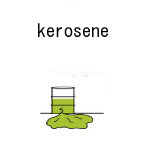| Case Name |
Leakage caused due to delay in valve operation on loading kerosene into a tanker |
| Pictograph |

|
| Date |
September 28, 1990 |
| Place |
Kawasaki, Kanagawa, Japan |
| Location |
Refinery |
| Overview |
On loading kerosene into a small tank, closing a distribution valve to the hatches was delayed and kerosene overflowed from the hatch. Half-hearted confirmation of work details caused miss-operation, thus sea was polluted by leakage. |
| Incident |
Kerosene flowed into the sea because the distribution valve to the hatches was left open on loading 300 kiloliters of kerosene into a small tanker. |
| Processing |
Manufacture |
| Individual Process |
Transfer |
| Substance |
Kerosene |
| Type of Accident |
Leakage, environmental pollution |
| Sequence |
10:12. on September 28th, 1990. Kerosene flowed out. |
| Cause |
An overflow due to forgetting to close the valve. |
| Response |
The spread was prevented by oil fence extension. Leaked oil was gathered. |
| Countermeasures |
Confirmation of instructions and a state of work during loading should be ensured. |
| Knowledge Comment |
For collaborative work such as shipping, it is important to make detailed arrangements in advance in terms of work instructions and work confirmation. |
| Background |
There was insufficient communication among workers. |
| Incidental Discussion |
There was a variance in the quantity of the outflow into the sea among different sources of information. As kerosene becomes a very thin film, which can spread over a wide area of the sea, it might look like a large quantity. Considering the capacity of the loading pump, even the biggest estimate value of five kiloliters is possible. Which estimate is correct is still a big question. The constant volume shipping facilities of the instrumentation system can automatically control the whole loading quantity. It seems that many parts of work to switch hatches during loading are done on manual. |
| Reason for Adding to DB |
Example of leakage caused due to insufficient communication among workers |
| Scenario |
| Primary Scenario
|
Carelessness, Insufficient Precaution, Inadequate Handling, Organizational Problems, Inflexible Management Structure, Insufficient Information and Communication, Regular Operation, Erroneous Operation, Forgot, Delayed !, Secondary Damage, External Damage, Leakage, Secondary Damage, Damage to Environment, Leakage to the Sea
|
|
| Sources |
High Pressure Gas Safety Inst. of Japan. Tanker under cargo handling. Leakage to sea. Accident examples of Petroleum refinery and Petrochemical units. p.102(1995)
|
| Consequences |
Five liters of kerosene leaked, of which one liter flowed into the sea (High Pressure Gas Safety Inst. of Japan).
Sixty liters flowed into the sea (Fire and Disaster Management Agency).
Five kiloliters flowed into the sea (Asahi Shimbun). |
| Field |
Chemicals and Plants
|
| Author |
WAKAKURA, Masahide (Kanagawa Industrial Technology Research Institute)
TAMURA, Masamitsu (Center for Risk Management and Safety Sciences, Yokohama National University)
|